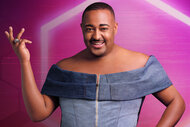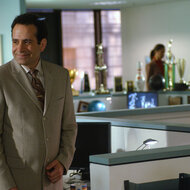Is It Possible to Spot a Liar? The Science Behind USA's The Anonymous
From truth serums to polygraphs, is it possible to tell when someone is lying?

These days we all have to engage with people who act one way in person and another way online. The distance of a computer monitor and the anonymity of a screen name sometimes brings out the worst in people, even people we otherwise consider friends. USA Network’s The Anonymous is an upcoming reality show which puts that dynamic to the test with $100,000 on the line.
Players interact in two disparate domains. First, they hang out together in the real world. They make friends and form alliances face-to face. Contestants are free to omit information or lie outright, but they have to do it while they look one another in the eye. Then, players move to their own secret "hideouts" where they enter the chat, hidden behind anonymous avatars (a slice of pizza, a football, a fish, etc.).
RELATED: Meet DANI, The Anonymous' Sassy A.I. Host & Master of the House
Poor performance or negative social dynamics in the real-world portion of the game could put someone at risk, and only the person who most successfully obscures their anonymous identity earns the power to send someone home. Success in the game is about being liked, but it’s also about being a good liar and knowing when you’re being lied to.
Detecting Deception from Polygraphs to Body Language
From so-called "truth serums" to modern-day polygraph machines, humans have been trying for centuries to reliably detect a lie. So far, we haven’t been successful. Polygraph machines are famously unreliable and are rarely admitted as evidence in an actual investigation.
For those not in the know, polygraphs measure certain physiological signals like heart rate, breathing, and perspiration. The idea is that telling the truth is cognitively easy; all you have to do is recall what happened, but lying takes work and is stressful. Stress typically causes a spike in heart rate, breathing rate, and sweat production, all of which the polygraph can detect.
The major problem is that a lot of things cause stress, including being questioned for a crime you didn’t commit. A polygraph can’t really tell you if someone is lying — the best it can do is detect symptoms that might be caused by lying.
Technology aside, many people are fairly confident they can “just tell” when someone is lying. It’s commonly believed that there are physical tells, like touching your face or averting your gaze. The thinking is actually pretty similar to a polygraph, that lying somehow leaks out of you and becomes detectable in the way you speak or carry yourself.
Across cultures, people believe they can sniff out a liar by watching for nonverbal cues, but the research suggests that isn’t so.
A 2003 study focused on 158 alleged cues to deception and found that most of them had no link or only a weak link to actual deceit. All of the supposed tip-offs you’ve heard about (being fidgety or avoiding eye contact, for example) don’t have any statistically significant connection to whether someone is telling the truth or not.
Still, people continue to think they can figure out who’s lying by searching for some external cue. In experiments, volunteers successfully picked out the liars from the truth-tellers about half the time — as well as they would have done if they’d flipped a coin. Even professional investigators aren’t any better at picking out liars based on these kinds of non-verbal cues.
It’s been suggested that ordinary people have a bias toward truth. We assume people are dealing with us honestly most of the time. By contrast, professional investigators may have a bias toward expecting lies. Whatever the bias, it leads people to make wrong assumptions and wrong conclusions.
Lies Can be Too Weird or Not Weird Enough
Instead of looking for a twitchy eye, you’re better off looking for deviations from a person’s norm.
Studies have shown that people are better at detecting lies from people they are close to. That’s because they know how that person behaves the majority of the time, and they notice when something changes. Getting “weird vibes” from a friend or family member won’t tell you what they're hiding, but it’s a relatively reliable indicator that they might be hiding something. Which is why it's imperative the contestants on The Anonymous get to know each other quick.
It’s more difficult to tell when a stranger is lying because you don’t know what they are like when telling the truth. Moreover, “ordinary behavior” varies from person to person, and what’s unusual for one person might be totally normal for someone else.
At present, there’s no good evidence that body language indicates deception, but there might be clues in what people say or, more accurately, what they don’t say. Experts suggest that liars tend to provide fewer details than truth tellers when recounting a false series of events. Additionally, when comparing stories told by liars, they had fewer complications than stories told by truth tellers.

RELATED: Love Island USA's Serena Page and Kordell Beckham Are Official
Things go wrong in real life, so when you’re telling a true story, you’re likely to include the part about how you were 15 minutes late because a bird got caught in your hair (or whatever). Liars don’t come up with those sorts of details. An unexpected consequence is that a liar’s version of events can often seem more realistic than the bizarre truth.
If you really want to sniff out the liars among you, the best tactic seems to be to get people talking, watch how they behave compared to previous interactions, and wait for them to say something you know to be untrue. When you later present information that contradicts their original story, watch how they accommodate the new information.
Rather than a binary detection of truth or falsehood, most successful deception detection is an active back-and-forth between the suspect and the suspicious. The person who wins The Anonymous will be the one who most successfully tunes into the baseline vibes of their competitors and sets their BS detector accordingly.
The Anonymous kicks off with a three-episode premiere on Monday, August 19 at 11 p.m. ET/PT on USA Network. Episodes will also air simultaneously across Bravo and SYFY on premiere night and repeat in primetime daily on USA throughout the week.















